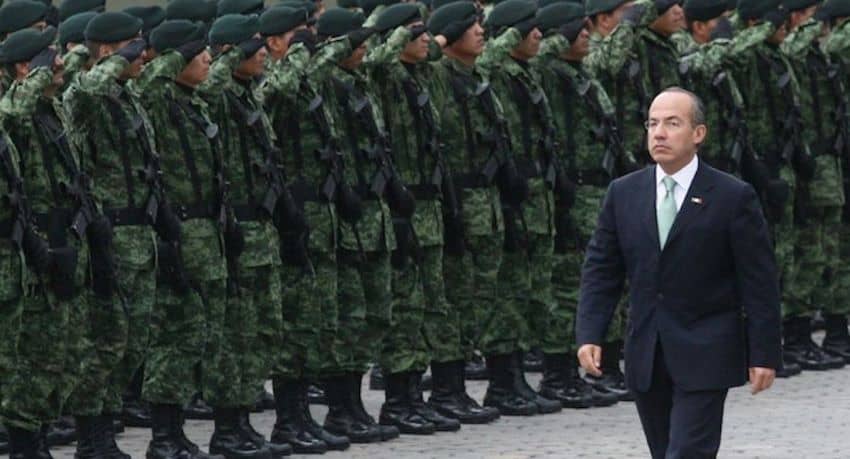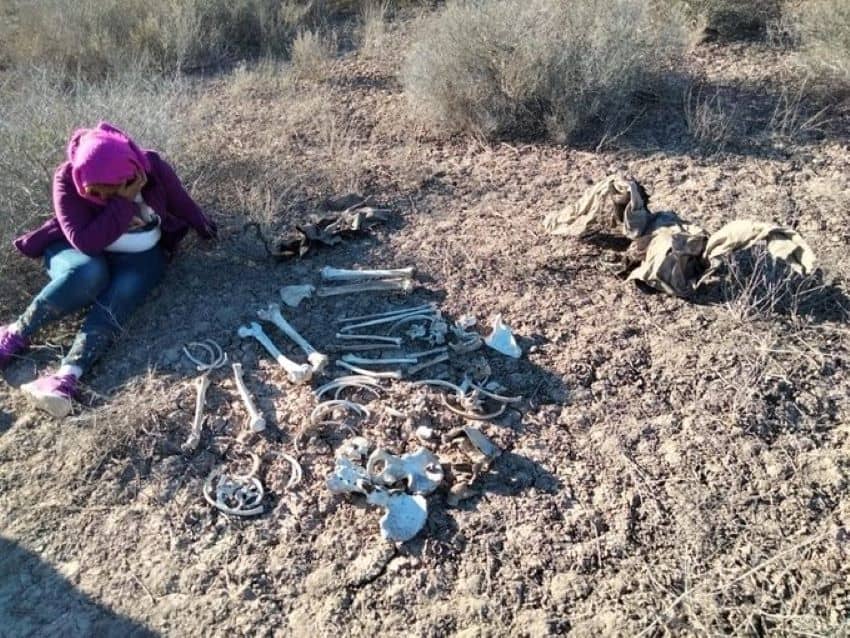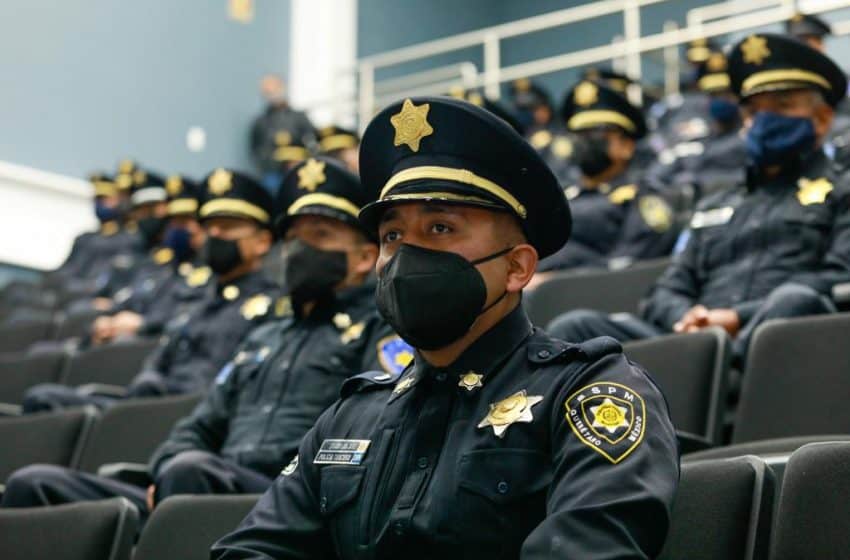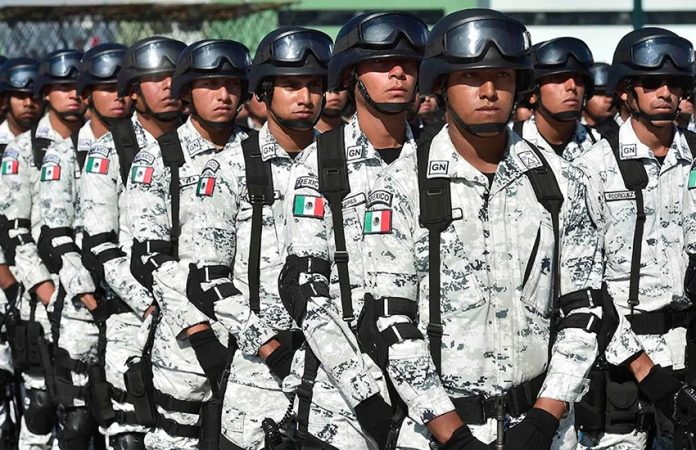The results of the militarized war on crime, launched by former president Felipe Calderón almost 15 years ago, have been “catastrophic,” the Washington Office on Latin America (WOLA) says in a new analysis.
Written by the research and advocacy organization’s director for Mexico and migrant rights, Stephanie Brewer, the analysis notes that Mexico has recorded approximately 350,000 homicides since Calderón deployed the armed forces to combat organized crime in December 2006.
It also notes that annual homicides have more than tripled since the intensification of the war on crime.
Published under the title Militarized Mexico: A Lost War that Has Not Brought Peace, the analysis acknowledges that former president Enrique Peña Nieto, who followed Calderón in 2012, perpetuated the militarized public security model with some differences.
And it notes that President López Obrador has failed to demilitarize public security despite his criticism of the militarized model before he became president and his pledge to take the armed forces off the streets.
“On the contrary, he has deepened various aspects of the militarized model,” Brewer writes, noting that this month marks the first anniversary of the president’s decree ordering the armed forces to continue carrying out public security tasks until 2024.

She also notes that while the National Guard, which was created by the current federal government, is officially part of the civilian Ministry of Security, it is in fact “a militarized force that operates under the coordination of the Ministry of Defense.”
“… Militarization has morphed from a supposedly temporary measure into a long-term strategy,” the analysis states, referring to the heavy reliance on the armed forces for public security tasks by Calderón, Peña Nieto and López Obrador.
“…The results of the militarized war on crime have been catastrophic. Homicides increased dramatically from the Calderón presidency onwards. Arrests and killings of kingpins have fostered the fragmentation of criminal groups, leading to increased violence. Shootouts with security forces trigger increases in local homicide rates. The overwhelming majority of the tens of thousands of people the government reports as disappeared were taken in the past 15 years.”
Brewer notes that various analysts have identified a decrease in federal security forces’ levels of frontal combat against criminal groups over the past two years and describes their “scaling back the use of warlike tactics” as a positive step.
“However, this modification in the strategy has not been accompanied by appropriate and sufficient measures to address ongoing violence … Today, a range of criminal groups continues to victimize the population while homicides remain at record levels,” WOLA’s Mexico director writes.
Her analysis states that Mexican authorities have not used the nearly 15 years of militarization to implement sustainable and effective anti-violence measures across Mexico.
“Instead of buying time for authorities to implement solutions, militarization has become the addiction that postpones those solutions indefinitely,” Brewer writes.
She asserts that prioritizing the reform and professionalization of civilian police institutions is necessary to develop an effective security model.
“… Achieving this requires overcoming once and for all the historic lack of commitment to police reform at all three levels of government,” Brewer writes.
However, during the 2 1/2 years since the current federal government came to power, “the creation of the National Guard has been a much more visible priority than police reform,” she says.
Brewer also notes that the militarized war on crime triggered high levels of serious human rights violations such as enforced disappearances, extrajudicial killings, arbitrary detentions and torture committed by security force members.
“… According to an analysis by the World Justice Project … 88% of people detained by the navy and 85% of people detained by the army from 2006–2016 reported torture or ill-treatment. According to the same official survey, 41% of women detained by the navy, 21% of women detained by the army, and 10%–13% of women detained by police forces reported having survived rape in the context of the detention,” the analysis states.

Brewer notes that the armed forces are also currently engaged in a range of other nontraditional tasks, including the construction and administration of infrastructure projects, immigration control and distribution of Covid-19 vaccines.
“… In any country in Latin America — a region whose history has been marked by coups and military dictatorships — the delegation of civilian tasks to the armed forces raises red flags,” she writes.
“… Mexico’s experience has differed from that of other countries: throughout the wave of dictatorships in the region, Mexico suffered no military coups. However, the influence of Mexico’s armed forces within and beyond the security sphere may mean that a coup is not necessary in order for them to wield levels of power that, while falling short of a military government, hardly speak of a healthy democracy.”
Brewer writes that it appears unlikely that militarism in Mexico will decline in the near future given that “López Obrador sees the armed forces’ participation in government tasks as a strategy to fight corruption” and guarantee efficiency.
In that context, she warns that the president could also give the military responsibility for “an indefinite list of other civilian functions.”
In her conclusions, the WOLA director notes that it is the people of Mexico who have suffered the greatest losses during the country’s almost 15-year-long militarized war on crime.

“The militarized model has increased violence without furthering effective security strategies,” Brewer writes.
“As WOLA and other organizations and experts have emphasized on numerous occasions over the past 15 years, no deployment of security forces will be sufficient to reverse violence as long as authorities are among criminal networks’ accomplices; as long as civilian police reform lacks commitment; as long as the country’s institutions do not make significant progress in investigating criminal phenomena; and as long as institutions charged with consolidating the rule of law tolerate human rights violations,” her analysis states.
“Addressing these factors — ensuring a constant focus on protecting the population — should be at the heart of Mexico’s anti-violence strategy. Such a strategy requires political will and close follow-up to take hold at the national level,” Brewer writes.
“What is concerning is that the government seems instead to be opting for a deepening and indefinite dependence on the armed forces.”
Mexico News Daily
